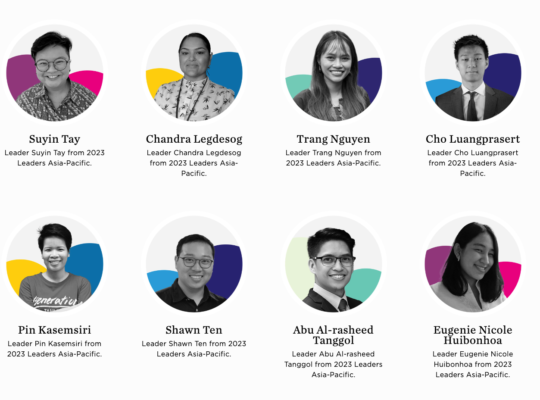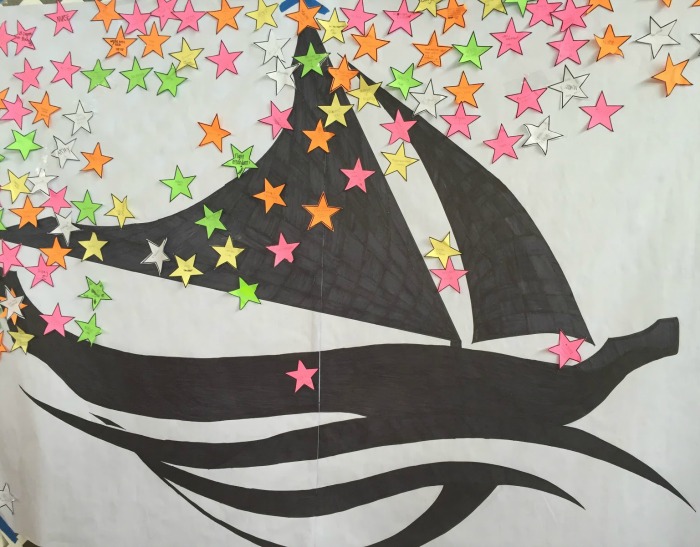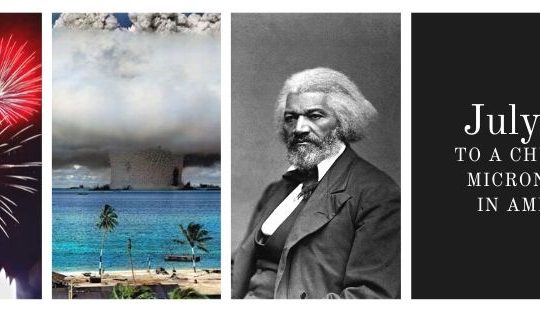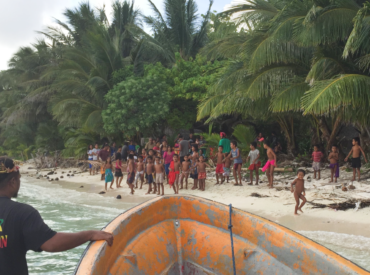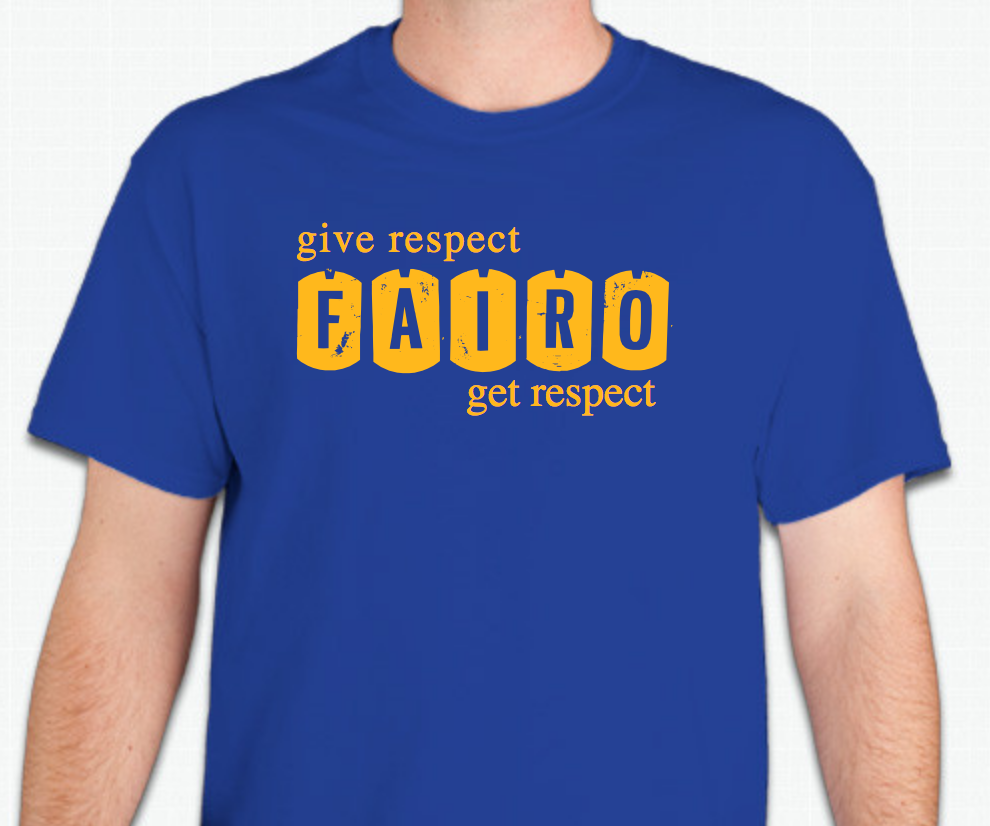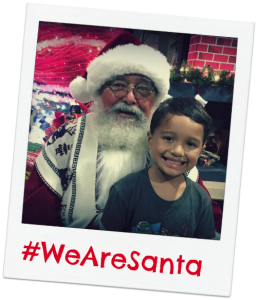 On this eve of Christmas Day, I find myself reflecting on a question my 5-year old son asked me this morning on the way to his camp at the Imiloa Astronomy Center. In my attempt to gently remind him to be grateful for everything he receives tomorrow, I might have taken it too far. I had shared with him that I never received any gift on Christmas growing up as a child on Houk Island. I was caught off guard when he asked,
On this eve of Christmas Day, I find myself reflecting on a question my 5-year old son asked me this morning on the way to his camp at the Imiloa Astronomy Center. In my attempt to gently remind him to be grateful for everything he receives tomorrow, I might have taken it too far. I had shared with him that I never received any gift on Christmas growing up as a child on Houk Island. I was caught off guard when he asked,
“How come Santa didnʻt come to Houk, Dad?” he inquired.
“Well…um, ahhh, umm, I donʻt know, buddy,” I stuttered.
All I could muster up was, “Maybe he was too busy visiting all the kids in America.”
Yikes!
I was saved by his next question,
“Dad, are we going to Starbucks to get lemon pound cake?” to which I quickly responded, “Yes, buddy, weʻre going to Starbucks!”
He saved me from having to desperately change the subject to something more joyful like, “How about them Golden State Warriors?!” just to end the Santa-freakin-Claus-topic.
 You see, growing up on Houk, a small remote island in the middle of the Pacific Ocean, our Christmases were very simple. We lived in thatched huts, no chimneys, and no sneaky Santas. We didnʻt know there was an entire Christmas Season filled with Christmas lights, Black Friday, sales at department stores, and the usual mad rush associated with the American Christmases. On the eve of Christmas the men and boys would go out and do a communal fishing. The catch would be brought back and distributed according to the normal protocol in our matrilineal culture: women first, then girls, followed by the boys, and lastly the men. The more females a clan has, the more fish.
You see, growing up on Houk, a small remote island in the middle of the Pacific Ocean, our Christmases were very simple. We lived in thatched huts, no chimneys, and no sneaky Santas. We didnʻt know there was an entire Christmas Season filled with Christmas lights, Black Friday, sales at department stores, and the usual mad rush associated with the American Christmases. On the eve of Christmas the men and boys would go out and do a communal fishing. The catch would be brought back and distributed according to the normal protocol in our matrilineal culture: women first, then girls, followed by the boys, and lastly the men. The more females a clan has, the more fish.
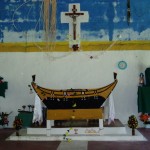 We looked forward to the Christmas Eve midnight prayers or mass with the entire island of about 300 people. I cherished the pennies (occasionally a dime) that my mom would fish out of her plywood locked box of valuables and distribute to the kids to put in the collection basket at church. We carried that coin in the fold of our afitita (loin cloth) on the walk to the community church with such care and pride. In that subsistence living where the ocean, land, and air sustained our daily needs, we needed very little money. We all depended on what we could grow, catch, and harvest.
We looked forward to the Christmas Eve midnight prayers or mass with the entire island of about 300 people. I cherished the pennies (occasionally a dime) that my mom would fish out of her plywood locked box of valuables and distribute to the kids to put in the collection basket at church. We carried that coin in the fold of our afitita (loin cloth) on the walk to the community church with such care and pride. In that subsistence living where the ocean, land, and air sustained our daily needs, we needed very little money. We all depended on what we could grow, catch, and harvest.
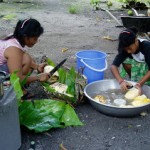 Since we had no refrigeration, food preparation would begin into the night and early Christmas Day for the island-wide potluck feast of fish, lobsters, octopus, coconut craps, bananas, taro, breadfruit, coconuts, etc. All freshly made. Equally distributed to all households. Shared on the grassy area between the community hall (uutulap) and the church (imwenipin). Then the traditional dances would begin. Simple. Celebratory. Communal. No wrapped gifts. No chimneys. No Santas.
Since we had no refrigeration, food preparation would begin into the night and early Christmas Day for the island-wide potluck feast of fish, lobsters, octopus, coconut craps, bananas, taro, breadfruit, coconuts, etc. All freshly made. Equally distributed to all households. Shared on the grassy area between the community hall (uutulap) and the church (imwenipin). Then the traditional dances would begin. Simple. Celebratory. Communal. No wrapped gifts. No chimneys. No Santas.
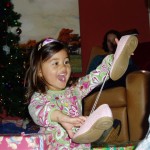 How life has changed. I realize how much I long to capture the essence of that simplicity for my two children, but I canʻt. Christmas is synonymous with Santa Claus who brings gifts.
How life has changed. I realize how much I long to capture the essence of that simplicity for my two children, but I canʻt. Christmas is synonymous with Santa Claus who brings gifts.
So, how do I enliven for my children the communal spirit of Christmas that was so part of my upbringing? How do I help my kids to value simplicity of life, the culture of generosity of spirit rather than the monstrosity of a gift? How do I explain to my kids about the true spirit of Santa Claus that lives in their humanity so they become Santas all yearlong to others in need?
How do I ensure that I donʻt minimize their experience of a materialistic Christmas, but maximize their experience of the heart that goes into the act of giving so they never lose sight of gratitude for everything they receive small or large?
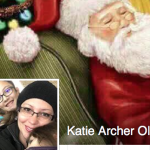 Maybe my friend Katie Archer Olson got it right in her letter to her daughter about Santa. To me the letter communicates the more important message to a child that We Are Santa to each other. In some profound way, my childhood upbringing without the beared Santa was filled with acts of love and kindness of my island community; that is no different today as Desha and I do our best to raise our kids with love symbolized by Santa, expressed in action by our friends, loved ones, colleagues, teachers, etc.
Maybe my friend Katie Archer Olson got it right in her letter to her daughter about Santa. To me the letter communicates the more important message to a child that We Are Santa to each other. In some profound way, my childhood upbringing without the beared Santa was filled with acts of love and kindness of my island community; that is no different today as Desha and I do our best to raise our kids with love symbolized by Santa, expressed in action by our friends, loved ones, colleagues, teachers, etc.
At the end of the day, when Christmas lights are stored away, presents are forgotten, and the jolly good fella retires to the North Pole, we are left with the responsibility of being Santa to each other year round. That is Santa. That is Christ-like. That is Christmas.
Hereʻs Katieʻs letter. Thank you, Katie.
My Dearest ______,
My heart aches as I consider typing this letter, but you asked a very good question: “Are you Santa?”
I know you’ve wanted the answer to this question for a long time, and I’ve had to give it careful thought to know just what to say. The answer is no. I am not Santa. There is no one Santa. I am the person who fills your stockings with presents, though. I also choose and wrap the presents under the tree, the same way my dad did for me.I imagine you will someday do this for your children, and I know you will love seeing them run down the Christmas magic hallway on Christmas morning. You will love seeing them sit under the tree, their small faces lit with Christmas lights. This won’t make you Santa, though.
Santa is bigger than any person, and his work has gone on longer than any of us have lived. What he does is simple, but it is powerful. He teaches children how to have belief in something they can’t see or touch.
It’s a big job, and it’s an important one. Throughout your life, you will need this capacity to believe: in yourself, in your friends, in your talents, and in your family. You’ll also need to believe in things you can’t measure or even hold in your hand. Here, I am talking about love, that great power that will light your life from the inside out, even during its darkest, coldest moments.
Santa is a teacher, and I have been his student, and now you know the secret of how he gets down all those chimneys on Christmas Eve: he has help from all the people whose hearts he’s filled with joy. With full hearts, people like Casey and me take our turns helping Santa do a job that would otherwise be impossible.
So, no, I am not Santa. Santa is love and magic and hope and happiness. I’m on his team, and now you are, too.
May the magic of Christmas ALWAYS burn inside of you and as you open each gift, may it remind you of the gift of Christ. Today, tomorrow and forever!!
I love you endlessly………
MamaThis is a formal contract and agreement. By signing this contract, you affirm that you believe and will uphold the magic of Christmas from this day forward. You will create and be a part of the magic for your sister and one day (when your 30) your own children. Any violation with word or action will swiftly put you on the naughty list, entitling you to old lady granny panties and boring socks for the rest of your life!!
If you can agree to these terms, sign below:
______________________________
